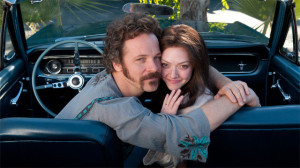Cinema routinely peddles images of beautiful people in romantic situations, not to mention gauzily idealized visions of passion and intimacy. So it’s a little counterintuitive when filmmakers depict sex as perilous — even when that’s exactly what they’ve signed up to do.
This reluctance hobbles Lovelace, the saga of the late Linda Lovelace, star of the epochal Deep Throat. In 1972, when that movie premiered, she seemed to embody a new ease about sex. But years later, after the film had become both a hit and a multipurpose metaphor, Lovelace returned to the public eye to denounce her former career and the ex-husband who’d arranged it.
Directors Rob Epstein and Jeffrey Friedman, whose Howl took an artier approach to an artier cultural watershed, attempt to give both Lindas equal weight by telling the story twice. But that just makes it seem as if they can’t make up their minds. And since the two parts aren’t that different in tone or style, Lovelace mostly plays like a standard biopic.
In the first half, naive Florida go-go dancer Linda Boreman (Amanda Seyfried) discovers love, porn and celebrity. After making Deep Throat — not her first sex flick, although this movie doesn’t mention that — the newly renamed Linda Lovelace romps through the sexual revolution. It’s like Boogie Nights with a tighter music budget.
Then the filmmakers jump to Lovelace’s moment of truth (or half-truth, according to her detractors). She’s hooked to a polygraph machine and questioned, in order to reassure the publisher of her revisionist 1980 memoir, Ordeal.

9(MDAzOTIwODA0MDEyNTA4MTM1OTcyMGJmMA001))

